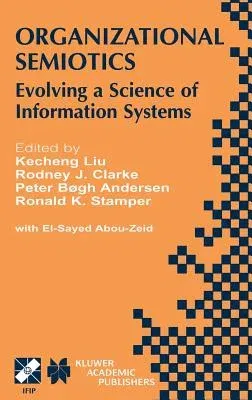Organizational Semiotics regards organizations as the real information
systems in which technologies have an essential role to play. It
develops this perspective using the established discipline of semiotics,
the theory of signs. A sign is anything that stands for something else
within a certain community. This fundamental notion supports a unified
treatment of human and technical aspects of information systems.
Organizational Semiotics: Evolving a Science of Information Systems
covers such issues as:
-Fundamental concepts such as 'information', 'data', 'message',
'communication', 'knowledge', 'organization', 'system' and so on;
-Properties of signs vital to organizational functioning, such as their
meanings, the intentions they express and the valuable social
consequences they produce;
-'Architecture' of organizations when they are viewed as information
systems, based on their semiotics features;
-Understanding language in organizational contexts, for example, the
limitations on the language used to conduct business affairs;
-The empirical study of communications for requirements elicitation;
-Applying semiotic categories (e.g. physical, empiric, syntactic,
semantic, pragmatic, social) to various problems;
-Organizational knowledge representation;
-Business process re-engineering methods and the design of e-commerce
systems.
This volume comprises the proceedings of the Working Conference on
Organizational Semiotics: Evolving a Science of Information Systems,
which was sponsored by the International Federation for Information
Processing (IFIP) and held in Montreal, Quebec, Canada in July 2001.
This Working Conference, the initiative of IFIP Working Group 8.1, was
preceded by related workshops over a period of six years; the
proceedings of the 1999 and 2000 meetings were published by Kluwer
Academic Publishers.
Organizational Semiotics: Evolving a Science of Information Systems
will be of prime interest to all those working in information systems,
especially researchers, lecturers, and students, as well as industrial
practitioners.

